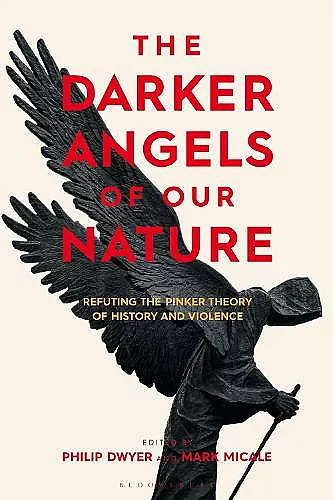The Darker Angels of Our Nature
Refuting the Pinker Theory of History & Violence
Philip Dwyer editor Mark Micale editor
Format:Paperback
Publisher:Bloomsbury Publishing PLC
Published:9th Sep '21
Currently unavailable, and unfortunately no date known when it will be back

An academic interrogation into the highly publicised Pinker argument that human violence is dramatically on the decline.
In The Better Angels of Our Nature Harvard psychologist Steven Pinker argued that modern history has witnessed a dramatic decline in human violence of every kind, and that in the present we are experiencing the most peaceful time in human history. But what do top historians think about Pinker’s reading of the past? Does his argument stand up to historical analysis?
In The Darker Angels of our Nature, seventeen scholars of international stature evaluate Pinker’s arguments and find them lacking. Studying the history of violence from Japan and Russia to Native America, Medieval England and the Imperial Middle East, these scholars debunk the myth of non-violent modernity. Asserting that the real story of human violence is richer, more interesting and incomparably more complex than Pinker’s sweeping, simplified narrative, this book tests, and bests, ‘fake history’ with expert knowledge.
[A]n intriguing and ambitious collection of essays ... by seventeen distinguished academics, who in various individual ways dissect the finer points of the Pinker narratives ... What this structure and breath of analysis deliver is a comprehensive and frequently penetrating criticism of the Pinker phenomenon on a multitude of levels and historical specifics. * Canadian Journal of History *
Darker Angels is not just an efficient and revealing demolition of Pinker's scholarship and argument, but a valuable contribution in itself to a debate about violence in history, and what we can do about it. * Counterfire *
This bracing and comprehensive set of essays on Steven Pinker’s influential case for the decline of violence is definitive in its arguments, while also controlled and justified in its exasperation. The implacable engagement demands a rethinking of the relationship between history and social science. * Samuel Moyn, Henry R. Luce Professor of Jurisprudence and Professor of History, Yale University, USA *
In this calm refuge from the unwarranted claims and relentless optimism of Steven Pinker’s recent books, Dwyer, Micale and their thoughtful colleagues offer new and wide-ranging ways to think about violence, history, and the civilizations that we humans have created and destroyed—a refreshing antidote to wishful thinking. * Barbara H. Rosenwein, Professor emerita Department of History, Loyola University Chicago, USA *
The historians in this constellation of essays come at Pinker’s controversial thesis with both hammer and tongs and a fine-tooth comb. With passion and care, they require fans and critics alike to consider the historical conditions that undergird arguments about the psychology of violence. It’s a book that even Pinker will have to reckon with. * Antoinette Burton, The University of Illinois at Urbana-Champaign, USA *
This volume enlists some of the best historians and historically-oriented social scientists working today to accomplish two urgent tasks. Collectively, they dismantle Steven Pinker’s popular and misleading thesis that we humans are living in an ever more peaceful world. They also open up vital questions about what counts as violence and how violence itself has changed over time. * Sophia Rosenfeld, Walter H. Annenberg Professor of History, University of Pennsylvania, USA *
This collection of essays restores common sense and a critical perspective to the discussion of the place of violence in our collective history. The important historical question as to the meaning of violence over time and space is a subject too important to be swept up in a paean of praise to ourselves. Dwyer and Micale are to be thanked for gathering together a set of incisive and original essays enabling us to go beyond Pinker’s work in the effort to do justice to the history of violence in our time. * Jay Winter, Charles J. Stille Professor of History emeritus, Yale University, USA *
Steven Pinker's pseudo-historical writings promote the worship of teleology and the naive acceptance of modern (Western) man's solipsistic claims to superiority over all "dark" Others, past and present. In this tenacious periodizing schema, "we" have rejected "the medieval" for an "enlightened" world of endless progress. These contributions by Philip Dwyer, Mark Micale, and their colleagues take well-aimed blows at the foundations of white privilege and patriarchy that undergird such ahistorical theories. * Carol Symes, Associate Professor of History, University of Illinois at Urbana-Champaign; Founding Executive Editor of The Medieval Globe, USA *
The brilliant and considered contributions to Darker Angels add up to a devasting indictment from which the 'Pinker thesis' will never recover. Demonstrating the shallow scholarship that informs so many of Pinker's empirical judgments, this book also shatters his Panglossian ideology that "all is for the best in this best of all possible worlds." * Jeffrey C. Alexander, Lillian Chavenson Saden Professor of Sociology, Yale University, USA *
ISBN: 9781350140592
Dimensions: 229mm x 150mm x 23mm
Weight: 640g
416 pages